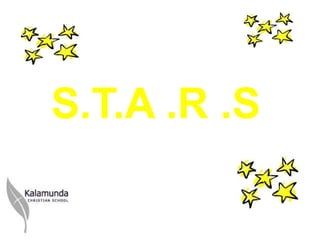Denunciar
Compartir

Recomendados
Recomendados
Más contenido relacionado
La actualidad más candente
La actualidad más candente (20)
Meetings: Communicating towards a Successful Outcome

Meetings: Communicating towards a Successful Outcome
Similar a Stars pp
Similar a Stars pp (20)
Developmental reading Lesson 6 levels of comprehension

Developmental reading Lesson 6 levels of comprehension
Grammar Proficiency - Phrases and Clausessession 3.pptx

Grammar Proficiency - Phrases and Clausessession 3.pptx
Eng 83 r week 6 day 1 022414 transitions and patterns of organization

Eng 83 r week 6 day 1 022414 transitions and patterns of organization
Thinking about our thinking wilson county training

Thinking about our thinking wilson county training
Más de gavinnancarrow
Más de gavinnancarrow (20)
Último
God is a creative God Gen 1:1. All that He created was “good”, could also be translated “beautiful”. God created man in His own image Gen 1:27. Maths helps us discover the beauty that God has created in His world and, in turn, create beautiful designs to serve and enrich the lives of others.
Explore beautiful and ugly buildings. Mathematics helps us create beautiful d...

Explore beautiful and ugly buildings. Mathematics helps us create beautiful d...christianmathematics
Último (20)
Seal of Good Local Governance (SGLG) 2024Final.pptx

Seal of Good Local Governance (SGLG) 2024Final.pptx
On National Teacher Day, meet the 2024-25 Kenan Fellows

On National Teacher Day, meet the 2024-25 Kenan Fellows
This PowerPoint helps students to consider the concept of infinity.

This PowerPoint helps students to consider the concept of infinity.
ICT Role in 21st Century Education & its Challenges.pptx

ICT Role in 21st Century Education & its Challenges.pptx
Explore beautiful and ugly buildings. Mathematics helps us create beautiful d...

Explore beautiful and ugly buildings. Mathematics helps us create beautiful d...
Web & Social Media Analytics Previous Year Question Paper.pdf

Web & Social Media Analytics Previous Year Question Paper.pdf
Python Notes for mca i year students osmania university.docx

Python Notes for mca i year students osmania university.docx
Asian American Pacific Islander Month DDSD 2024.pptx

Asian American Pacific Islander Month DDSD 2024.pptx
Micro-Scholarship, What it is, How can it help me.pdf

Micro-Scholarship, What it is, How can it help me.pdf
Stars pp
- 1. S.T.A .R .S
- 2. Finding the Main Idea • A sentence that tells what the passage is mainly about. • The best title for the passage. • I can ask myself “what is this passage mostly about”?
- 3. Recalling Facts and Details • Every passage has them. • They tell more about the main idea. • They are things that are mentioned in the passage. • I can look back to the passage to find them.
- 4. Understanding Sequence • Sequence is the same as the order. • A passage is told in sequence. • Different things happen at the beginning, middle and ending of a passage. • This is about remembering. • This is about putting events or details in order. • This is about first, second, next, later, lastly, before or after.
- 5. Cause and Effect • A cause is something that happens. • An effect is something that happens because of the cause. • Key words are why, what happened or because. • An example of a cause: I throw the ball. • An example of effect: The ball hit the wickets.
- 6. Comparing and Contrasting • How two things are alike or different. • Finding likenesses and differences. • Key words are: most like, different, alike or similar.
- 7. Making Predictions • Something I think will happen in the future. • What will probably or most likely happen next. • The answer is not written in the passage. • There are clues about the answer in the passage. • I can make a good guess from the clues
- 8. Finding Word Meaning In Context • I can find out what a word means by reading it in a sentence. • This is called understanding word meaning in context. • Find the unfamiliar word in a sentence. • Replace the word in the sentence with each answer choice. • See which answer makes the most sense.
- 9. Drawing Conclusions and Making Inferences • The author doesn‟t always tell us everything. • Figure it out on my own. • Example: The moon shone through the bedroom window as Lou sat up in bed. Conclusion: It is night time. • Key words are: you can tell or probably
- 10. Distinguishing Fact and Opinion • Which statements are facts and which are opinion. • A fact is something that is true. • An opinion tells about how a person feels about something. • Facts can be proven. • Opinions cannot be proven. • Opinion statements often contain: most, best, nicest and greatest.
- 11. Identifying Author‟s Purpose • Why did the author write the passage? • I can remember P.I.D.E. P - To persuade me to do something I - To give me information D - To describe something to me E - To entertain me
- 12. Interpreting Figurative Language • Some words are used to mean something different from their usual meaning. Example: „I spilled the beans‟. Meaning. „I didn‟t mean to tell the secret‟.
- 13. Distinguishing between Real and Make-believe • Find which things could happen and which things could not happen. • Things that are real - Things in a passage that could happen. • Things that are make-believe - Things in a passage that could not really happen. • Key words: could really happen or could not really happen.
- 14. References Adock, Deborah, Stars, Hawker Brownlow Education.
- 15. www.kalamundacs.wa.edu.au Visit our online resource pages